Were prayers of murderers, when fighting on the “right side” of the war, ever heard–let alone answered?Kristina McMorris
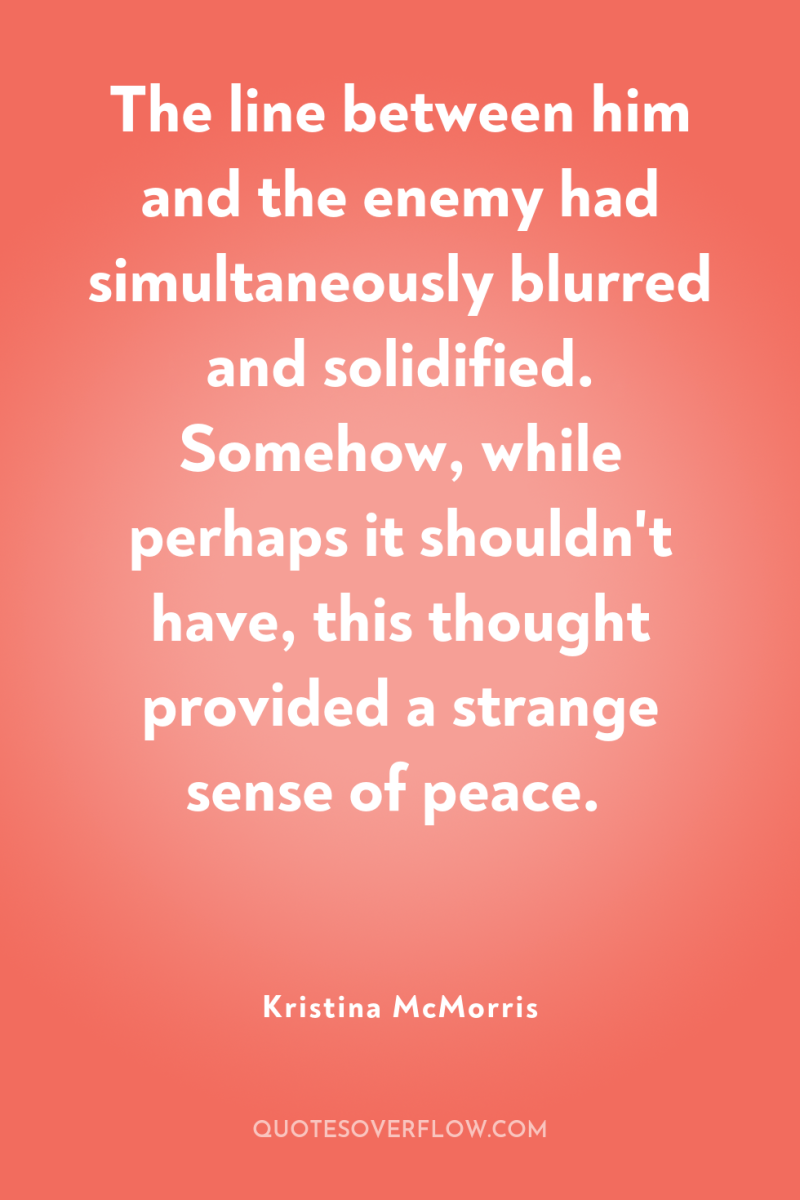
The line between him and the enemy had simultaneously blurred and solidified. Somehow, while perhaps it shouldn't have, this thought provided a strange sense of peace.Kristina McMorris

In seven days God had created the Earth. In a single day mankind had turned it upside down.Kristina McMorris
Brick walls towered over her. Decrepit staircases crowded about her. Nothing had changed. The line there, the lessons there, the rape there. Shouldn't the place be crimson with blood and black with shame?Sarah Sundin

Only happy people have nightmares, from overeating. For those who live a nightmare reality, sleep is a black hole, lost in time, like death.Guy Sajer
As I remember his laugh, there was nothing mad about it, it was more like the laugh of someone who has been the victim of a practical joke, a farce in which he had believed until suddenly he realized his folly.Guy Sajer
Aunt Rosa, a fussy, angular, wild-eyed old lady, who had lived in a tremulous world of bad news, bankruptcies, train accidents, cancerous growths–until the Germans put her to death, together with all the people she had worried about.Vladimir Nabokov

...we're dealing with two devils who both want to rule hell.Ruta Sepetys
SEPTEMBER 1, 1939I sit in one of the dives On Fifty-second StreetUncertain and afraid As the clever hopes expire Of a low dishonest decade: Waves of anger and fear Circulate over the bright And darkened lands of the earth, Obsessing our private lives; The unmentionable odour of death Offends the September night. Accurate scholarship can Unearth the whole offence From Luther until now That has driven a culture mad, Find what occurred at Linz, What huge imago made A psychopathic god: I and the public know What all schoolchildren learn, Those to whom evil is done Do evil in return. Exiled Thucydides knew All that a speech can say About Democracy, And what dictators do, The elderly rubbish they talk To an apathetic grave; Analysed all in his book, The enlightenment driven away, The habit-forming pain, Mismanagement and grief: We must suffer them all again. Into this neutral air Where blind skyscrapers use Their full height to proclaim The strength of Collective Man, Each language pours its vain Competitive excuse: But who can live for long In an euphoric dream; Out of the mirror they stare, Imperialism's face And the international wrong. Faces along the bar Cling to their average day: The lights must never go out, The music must always play, All the conventions conspire To make this fort assume The furniture of home; Lest we should see where we are, Lost in a haunted wood, Children afraid of the night Who have never been happy or good. The windiest militant trash Important Persons shout Is not so crude as our wish: What mad Nijinsky wrote About DiaghilevIs true of the normal heart; For the error bred in the bone Of each woman and each man Craves what it cannot have, Not universal love But to be loved alone. From the conservative dark Into the ethical life The dense commuters come, Repeating their morning vow;' I will be true to the wife, I'll concentrate more on my work, ' And helpless governors wake To resume their compulsory game: Who can release them now, Who can reach the dead, Who can speak for the dumb? All I have is a voice To undo the folded lie, The romantic lie in the brain Of the sensual man-in-the-street And the lie of AuthorityWhose buildings grope the sky: There is no such thing as the StateAnd no one exists alone; Hunger allows no choice To the citizen or the police; We must love one another or die. Defenseless under the night Our world in stupor lies; Yet, dotted everywhere, Ironic points of light Flash out wherever the JustExchange their messages: May I, composed like them Of Eros and of dust, Beleaguered by the same Negation and despair, Show an affirming flame.W.h. Auden
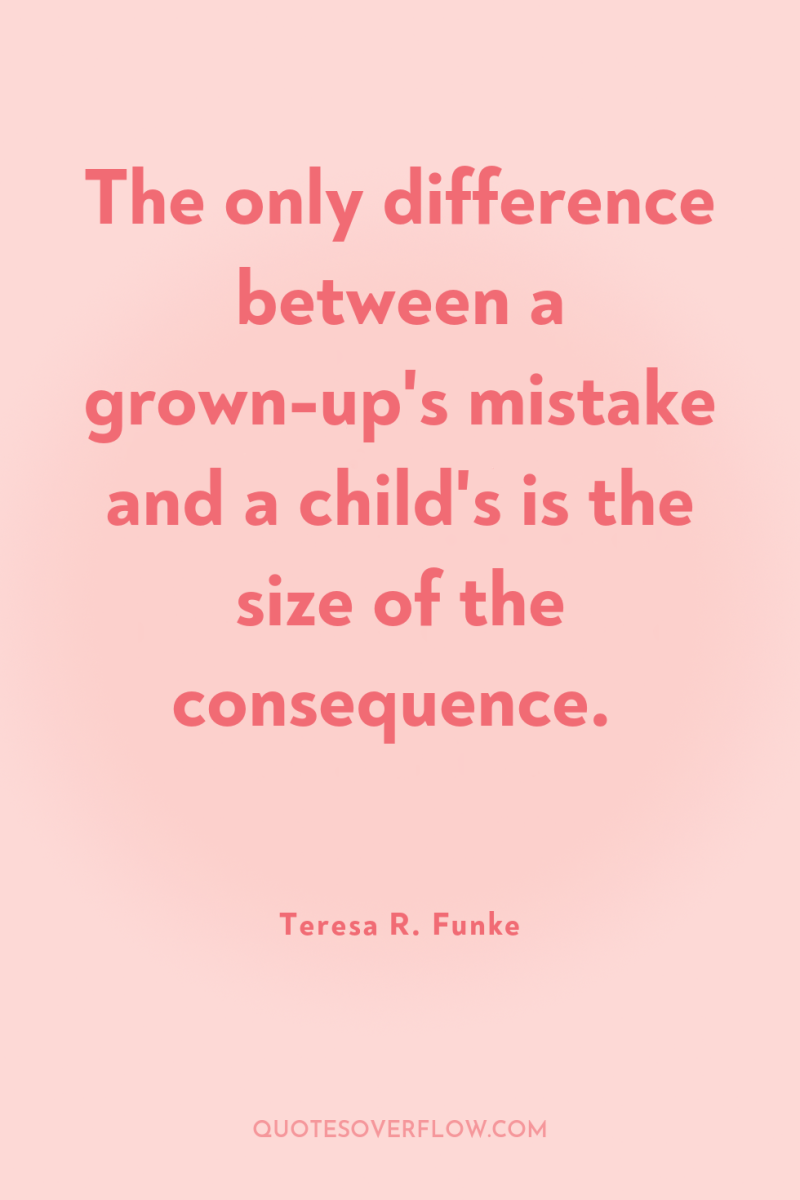
The only difference between a grown-up's mistake and a child's is the size of the consequence.Teresa R. Funke

The tears are falling freely now, and I don't care if he sees them. They're tears of relief for my nephew, worry for my grandfather and my brother, and shame for my mistake. I figure I earned them.Teresa R. Funke
At the laboratory, Turing designed the first relatively complete electronic stored-program digital computer for code breaking in 1945. Darwin deemed it too ambitious, however, and after several years Turing left in disgust. When the laboratory finally built his design in 1950, it was the fastest computer in the world and, astonishingly, had the memory capacity of an early Macintosh built three decades later.Sharon Bertsch McGrayne

The whole world can become the enemy when you lose what you love.Kristina McMorris
Look at me! ’ I screeched. ‘Look at me, Amadeus von Linden, you sadistic hypocrite, and watch this time! You’re not questioning me now, this isn’t your work, I’m not an enemy agent spewing wireless code! I’m just a minging Scots slag screaming insults at your daughter! So enjoy yourself and watch! Think of Isolde! Think of Isolde and watch!Elizabeth Wein
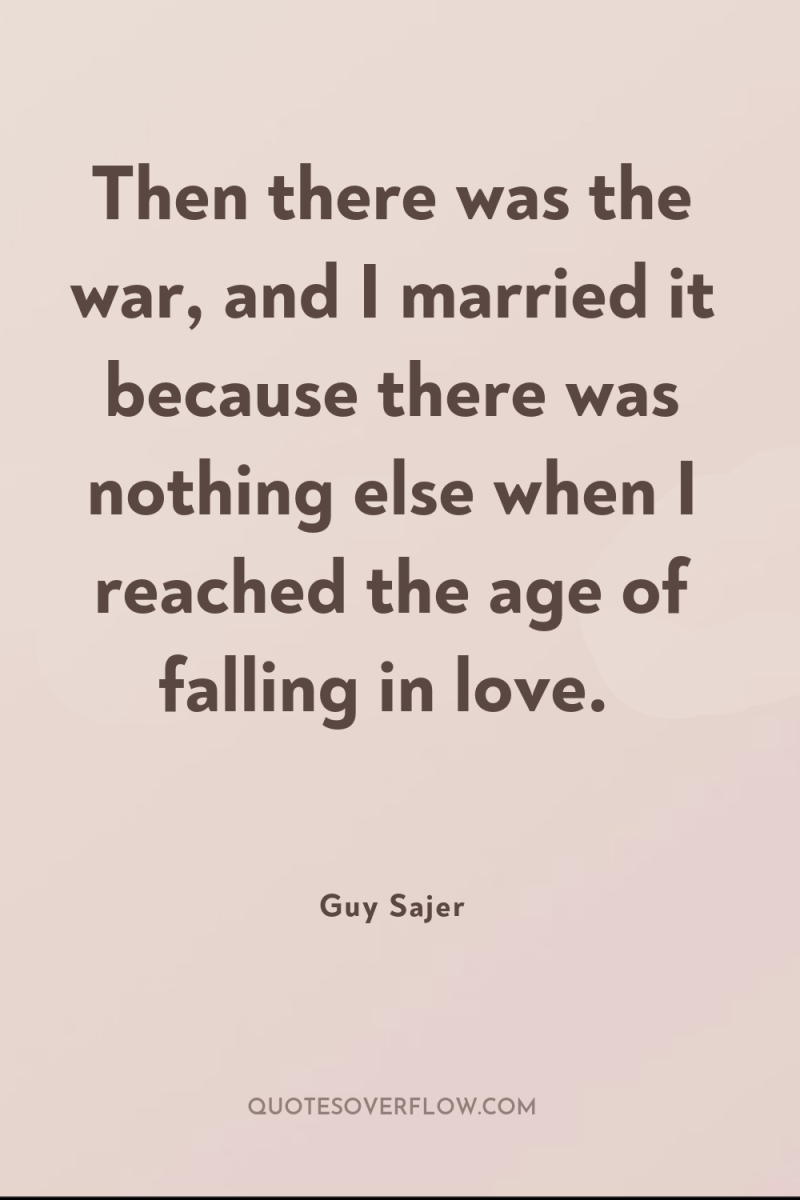
Then there was the war, and I married it because there was nothing else when I reached the age of falling in love.Guy Sajer
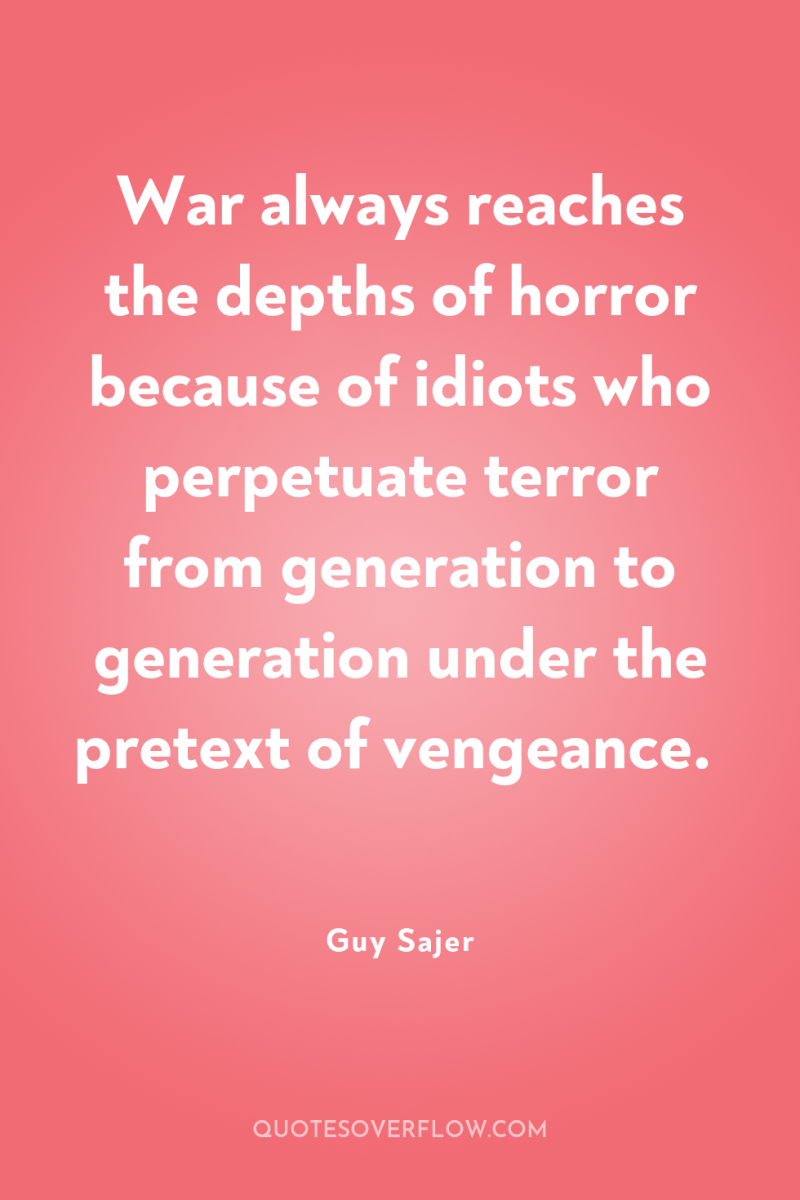
War always reaches the depths of horror because of idiots who perpetuate terror from generation to generation under the pretext of vengeance.Guy Sajer
Darwinism by itself did not produce the Holocaust, but without Darwinism... neither Hitler nor his Nazi followers would have had the necessary scientific underpinnings to convince themselves and their collaborators that one of the worlds greatest atrocities was really morally praiseworthy.Richard Weikart
This is no war of chieftains or of princes, of dynasties or national ambition; it is a war of peoples and of causes. There are vast numbers, not only in this Island but in every land, who will render faithful service in this war, but whose names will never be known, whose deeds will never be recorded. This is a War of the Unknown WarriorsWinston S. Churchill
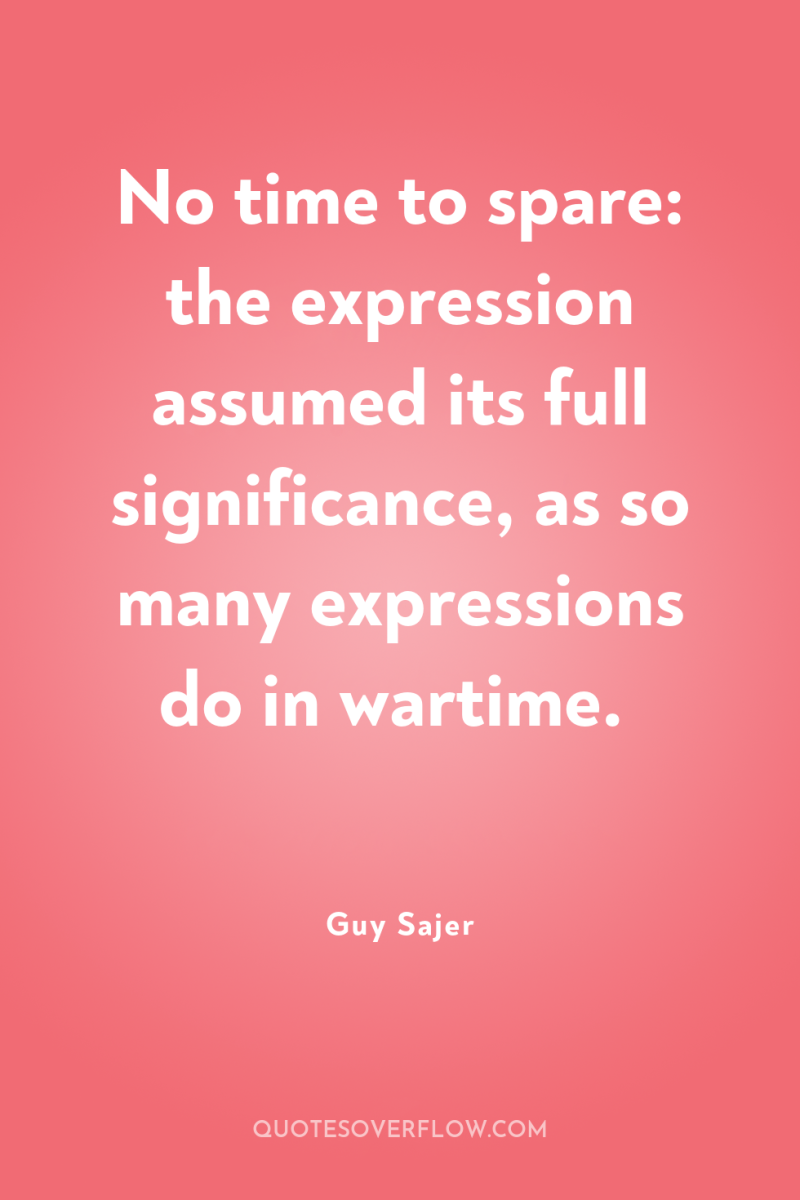
No time to spare: the expression assumed its full significance, as so many expressions do in wartime.Guy Sajer
This isn't to deny that there were fierce arguments, at the time and ever since, about the causes and goals of both the Civil War and the Second World War. But 1861 and 1941 each created a common national narrative (which happened to be the victors' narrative): both wars were about the country's survival and the expansion of the freedoms on which it was founded. Nothing like this consensus has formed around September 11th.. Indeed, the decade since the attacks has destroyed the very possibility of a common national narrative in this country. .George Packer
A not-too-distant explosion shakes the house, the windows rattle in their sockets, and in the next room the class of 1964 wakes up and lets out a yell or two. Each time this happens I find myself thinking, "Is it possible that human beings can continue with this lunacy very much longer?" You know the answer, of course.George Orwell

One day this war will end. And when it does, Tule Lake will be just a memory.Teresa R. Funke

The problems I had existed before I did, and I discovered them.Guy Sajer
What happened next? I retain nothing from those terrible minutes except indistinct memories which flash into my mind with sudden brutality, like apparitions, among bursts and scenes and visions that are scarcely imaginable. It is difficult even to even to try to remember moments during which nothing is considered, foreseen, or understood, when there is nothing under a steel helmet but an astonishingly empty head and a pair of eyes which translate nothing more than would the eyes of an animal facing mortal danger. There is nothing but the rhythm of explosions, more or less distant, more or less violent, and the cries of madmen, to be classified later, according to the outcome of the battle, as the cries of heroes or of murderers. And there are the cries of the wounded, of the agonizingly dying, shrieking as they stare at a part of their body reduced to pulp, the cries of men touched by the shock of battle before everybody else, who run in any and every direction, howling like banshees. There are the tragic, unbelievable visions, which carry from one moment of nausea to another: guts splattered across the rubble and sprayed from one dying man to another; tightly riveted machines ripped like the belly of a cow which has just been sliced open, flaming and groaning; trees broken into tiny fragments; gaping windows pouring out torrents of billowing dust, dispersing into oblivion all that remains of a comfortable parlor..Guy Sajer
I had often thought that if I managed to live through the war I wouldn't expect too much of life. How could one resent disappointment in love if life itself was continuously in doubt? Since Belgorod, terror had overturned all my preconceptions, and the pace of life had been so intense one no longer knew what elements of ordinary life to abandon in order to maintain some semblance of balance. I was still unresigned to the idea of death, but I had already sworn to myself during moments of intense fear that I would exchange anything - fortune, love, even a limb - if I could simply survive.Guy Sajer
Superficially my war was a comfortable exercise in futility carried out in a grand Scottish hotel amongst the bridge players and swillers of easy-come-by whisky. My chest got me out of active service and into guilt, as I wrote two, or is it three of the novels for which I am now acclaimed.Patrick White
It struck Yuki as almost comic that humans drew lines on the globe, and on both sides of those lines raised up armies. Then they fought and died to take possession of...what? Hills. Yuki knew he had to fight, and had to win, but that didn't make war anything to be proud of.Dean Hughes
I don't believe that the big men, the politicians and the capitalists alone, are guilty of the war. Oh no, the little man is just as guilty, otherwise the peoples of the world would have risen in revolt long ago! There's in people simply an urge to destroy, an urge to kill, to murder and rage, and until all mankind, without exception, undergoes a great change, great wars will be waged, everything that has been built up, cultivated, and grown will be destroyed and disfigured, after which mankind will have to begin all over again.Anne Frank
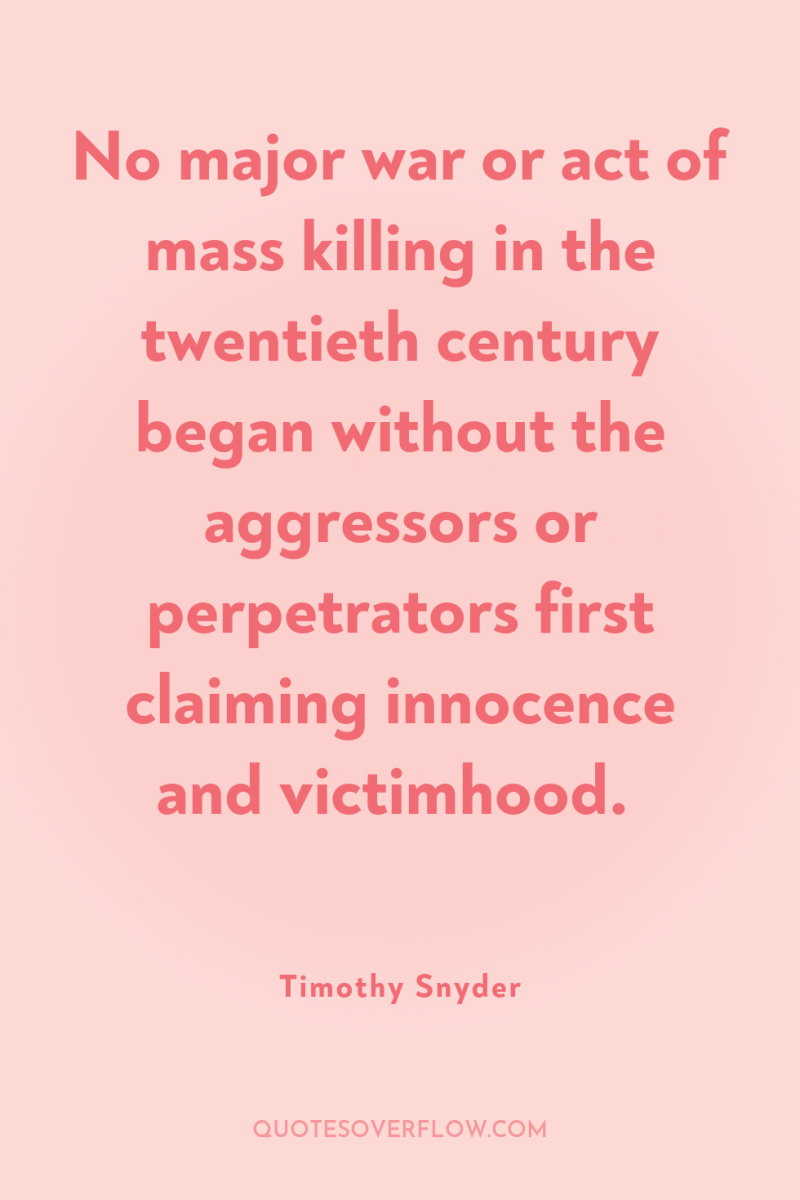
No major war or act of mass killing in the twentieth century began without the aggressors or perpetrators first claiming innocence and victimhood.Timothy Snyder

Just when you think this war has taken everything you loved, you meet someone and realize that somehow you still have more to give.Ruta Sepetys

Girls in love will do desperate and creative things.Monica Hesse

But I supposed love doesn't stop, even in wars.Monica Hesse
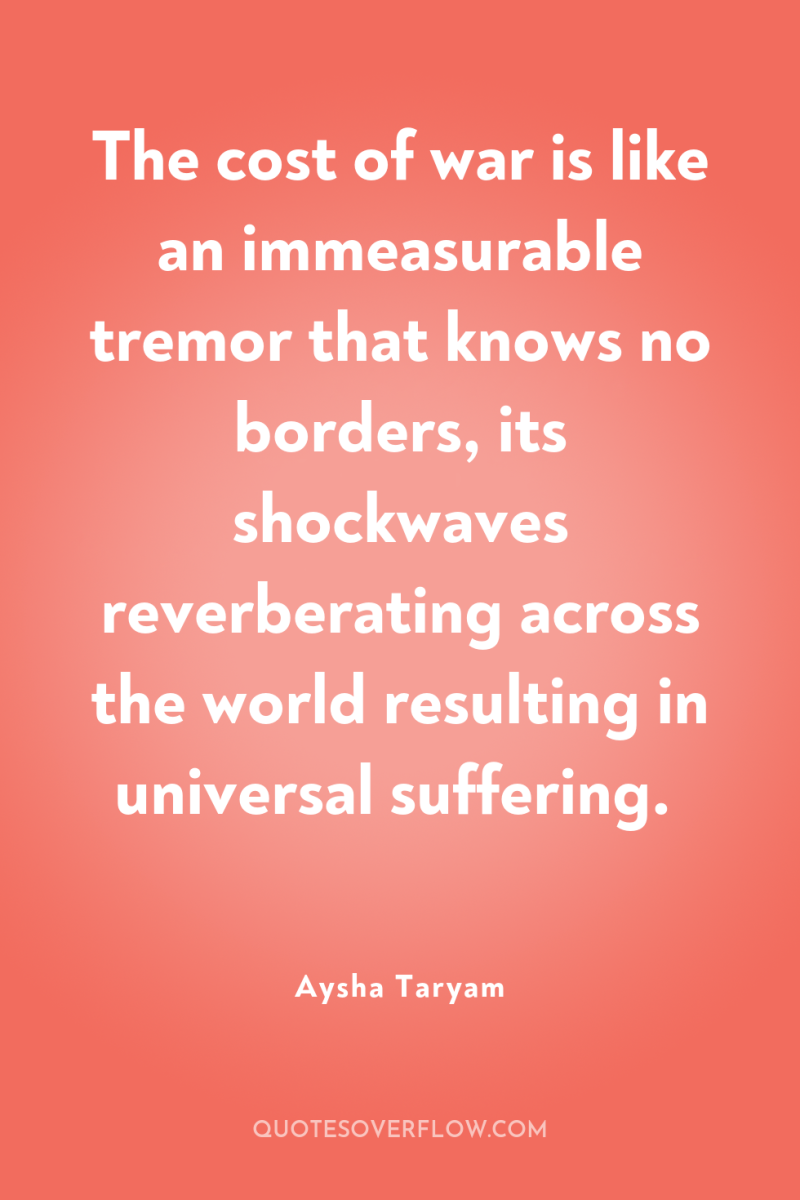
The cost of war is like an immeasurable tremor that knows no borders, its shockwaves reverberating across the world resulting in universal suffering.Aysha Taryam
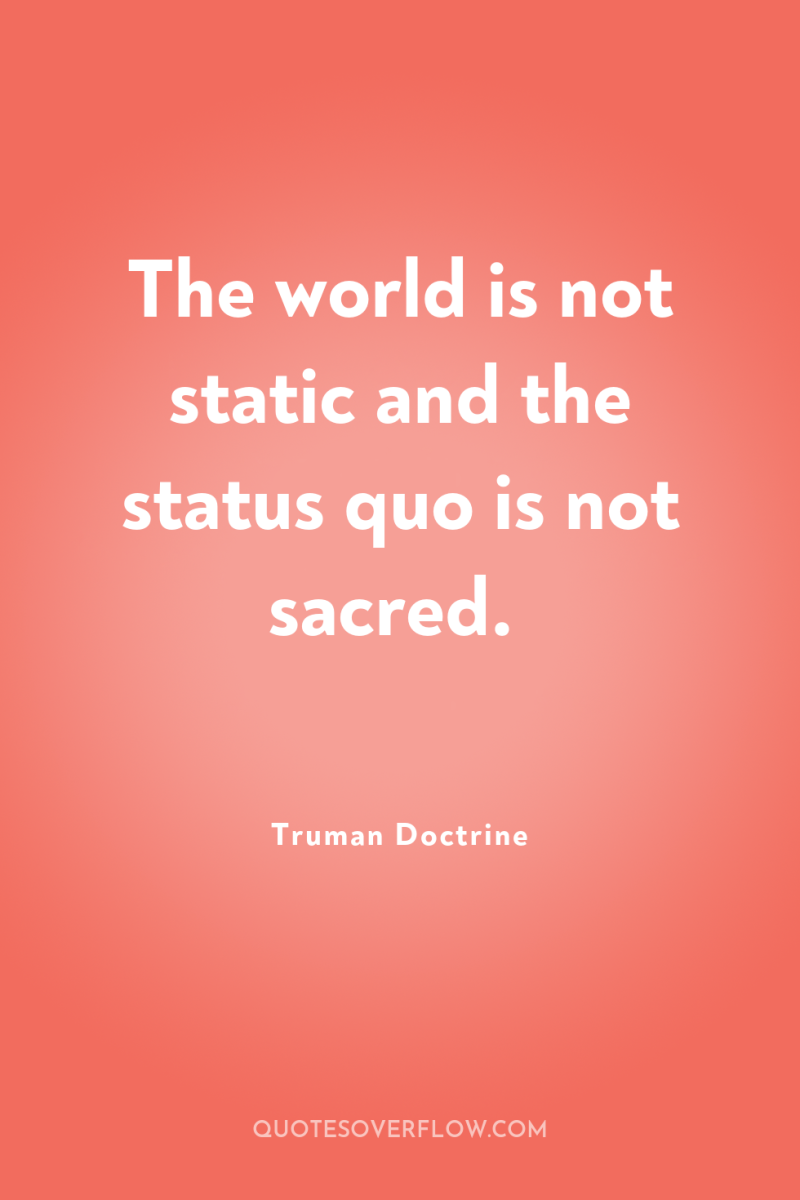
The world is not static and the status quo is not sacred.Truman Doctrine
Every line of serious work that I have written since 1936 has been written, directly or indirectly, against totalitarianism and for democratic socialism, as I understand it. It seems to me nonsense, in a period like our own, to think that one can avoid writing of such subjects. Everyone writes of them in one guise or another. It is simply a question of which side one takes and what approach one follows. And the more one is conscious of one's political bias, the more chance one has of acting politically without sacrificing one's aesthetic and intellectual integrity.George Orwell

It takes one a long time to become young. - PicassoPatsy Asuncion
She had an emptiness in her eyes like a ghost tired of haunting.Stuart Jaffe
‎I was cursed with the pessimism of both the Russians and the Jews two of the gloomiest tribes in the world. Still if there wasn't greatness in me maybe I had the talent to recognize it in others even in the most irritating others.David Benioff
It was now December 7, 1941; the date that Franklin D. Roosevelt was destined to declare would live in infamy.Randall Wallace
What you don’t know going in is that when you come out, you will be scarred for life. Whether you were in for a week, a month, or a year–even if you come home without a scratch–you are never, ever going to be the same. When I went in, I was eighteen. I thought it was all glory and you win lots of medals. You think you’re going to be the guy. Then you find out the cost is very great. Especially when you don’t see the kids you were with when you went in. Living with it can be hell. It’s like the devil presides in you. I knew what I sighed up for, yes, and I would do it again. But the reality of war–words can’t begin to describe it.William Guarnere
That is the way we decided to talk, free and easy, two young men discussing a boxing match. That was the only way to talk. You couldn't let too much truth seep into your conversation, you couldn't admit with your mouth what your eyes had seen. If you opened the door even a centimeter, you would smell the rot outside and hear the screams. You did not open the door. You kept your mind on the tasks of the day, the hunt for food and water and something to burn, and you saved the rest for the end of the war.David Benioff
In the end the war was Hitler's war. It was not perhaps the war he wanted. But it was the war he was prepared to risk if he had to. Nothing could deter him... He was no longer prepared to wait on events. He needed to force them to manipulate them to manufacture incidents to create pretexts for action.Donald Cameron Watt
In political affairs illusions are usually the product of a failure to appreciate change; but such failure-usually a necessary and perhaps salutary part of human affairs-becomes, when the change is very fast, not a stabilizing conservatism but a form of deception resembling lunacy.Laurence Lafore
How many rapes occurred inside the walls of the main camp of Ravensbrück is hard to put a figure to: so many of the victims–already, as Ilse Heinrich said, half dead–did not survive long enough after the war to talk about it. While many older Soviet women were reluctant to talk of the rape, younger survivors feel less restraint today. Nadia Vasilyeva was one of the Red Army nurses who were cornered by the Germans on the cliffs of the Crimea. Three years later in Neustrelitz, northwest of Ravensbrück, she and scores of other Red Army women were cornered again, this time by their own Soviet liberators intent on mass rape. Other women make no excuses for the Soviet rapists. ‘They were demanding payment for liberation, ’ said Ilena Barsukova. ‘The Germans never raped the prisoners because we were Russian swine, but our own soldiers raped us. We were disgusted that they behaved like this. Stalin had said that no soldiers should be taken prisoner, so they felt they could treat us like dirt.’ Like the Russians, Polish survivors were also reluctant for many years to talk of Red Army rape. ‘We were terrified by our Russian liberators, ’ said Krystyna ZajÄ…c. ‘But we could not talk about it later because of the communists who had by then taken over in Poland.’ Nevertheless, Poles, Yugoslavs, Czechs and French survivors all left accounts of being raped as soon as they reached the Soviet lines. They talked of being ‘hunted down’, ‘captured’ or ‘cornered’ and then raped. In her memoirs Wanda Wojtasik, one of the rabbits, says it was impossible to encounter a single Russian without being raped. As she, Krysia and their Lublin friends tried to head east towards their home, they were attacked at every turn. Sometimes the approach would begin with romantic overtures from ‘handsome men’, but these approaches soon degenerated into harassment and then rape. Wanda did not say she was raped herself, but describes episodes where soldiers pounced on friends, or attacked them in houses where they sheltered, or dragged women off behind trees, who then reappeared sobbing and screaming. ‘After a while we never accepted lifts and didn’t dare go near any villages, and when we slept someone always stood watch.Sarah Helm
It was a glorious experience for the children to travel by rail and the panoramic views of Africa through the big glass window in the rear of the last car of the Blue Train, were beyond description. It was just as you would expect it to be, as described in a vintage National Geographic magazine, with springbok and other wild animals abounding. The distance is approximately the same as from New York City to Chicago and took an overnight. Adeline and Lucia talked late into the night as the children tried to hear what was being said. There was a lot of catching up to do, but it had been a long and exhausting day and the next thing they all knew, it was the following morning and the train was approaching Cape Town or Kaapstad in Afrikaans, affectionately known as the “Tavern of the Seas.Captain Hank Bracker
During World War II the top secret “Norden XV” or “Blue Ox” otherwise known the Army Airforce’s “Norden M Series Bombsights, ” were used up to and including the Vietnam War by all American military aircraft with bomb carrying capabilities. This bombsight was considered a “Canonical Tachometric Design” meaning that it had the ability to measure the aircraft's direction and ground speed. In time the Norden improved its original design by using a computer that constantly calculated the aircraft’s flight characteristic and external wind forces to determine the bomb's impact point. When the B-17 Flying Fortress was designed, it came equipped with a Sperry A-3 Autopilot that only corrected angular deviations in the aircraft’s straight and level course. In time most bombsights were replaced by video displays on the instrument panel. Dumb or gravity bombs were mostly replaced with in-flight guidance bombs, such as laser-guided bombs or those using a GPS system. The last combat use of the Norden bombsight was by the US Navy during the covert “Operation Igloo White” mission when OP-2E Neptune aircraft dropped electronic sensors to detect enemy activity along the Ho Chi Minh Trail. Project CHECO Southeast Asia Report was declassified on May 5, 2013.Captain Hank Bracker
People who mock incidents in history such as 9/11 or the Holocaust, referring to it all as a hoax or stirring up crazy conspiracy theories about it, should really stop and think about their words first, both because it shows flaws in logic and rationality to deny the obvious, and because to play pretend with incidents which killed innocent people, well, that's just like laughing in the face of tragedy. It's as if to say, "no, it's not horrible enough that these people were killed, oh no, we have to drag on these incidents by indulging in melodramatic fantasies! " In essence this means that those who lost loved ones not only have to live with these losses forever, they also have to live with the people who deny that any of it ever happened. It does no good to forget history or to deny it. All it does is desensitize people; it tells them that it's all just a game, which then risks the possibility of nobody taking it seriously enough to prevent something similar from happening again. .Rebecca McNutt
For the greatest part the American bombardiers, using the Norden bombsight with its autopilot, hit their target. However on nights with poor visibility anything was possible. As the bombs fell, people pushed their way down the path towards the square concrete entrance to the bunker. In their frantic haste to get to safety they knocked each other down. Stepping onto each other, many people, especially the older ones, fell as they tried to get out of harm’s way, and were crushed. The pushing and shoving was relentless as the poor screaming people were trampled in the dark. My best friend Anna tried to bring some clothing with her. She was among those trampled and died when the sharp end of a coat hanger pierced her throat. The horror of it all brought the worst out in people, who behaved worse than animals. It wasn’t until the air raid was over that the wardens undertook the grim task of removing the bodies of these unfortunate victims. Photo Caption: The actual bunker in Mannheim, Germany.Hank Bracker
As with millions of others, Adeline Perry and her two young daughters endured the horrors of the Second World War in NAZI Germany. Following her death and armed with her manuscript, Captain Hank Bracker and his wife Ursula, Adeline’s youngest daughter, followed in Adeline’s footsteps to better understand the ordeal she experienced. Realizing that this book was the only way that her story could be preserved, Captain Hank took on the task of recording it. Ursula’s brother-in-law and stepsister, Peter Klett and his wife Jutta drove them to many of the places described in this book including Bischoffsheim, Strasbourg and Rosheim, in what was known as Reichsland Elsaß-Lothringen during World War II and which is now recognized as the administrative territory of Alsace-Moselle, France. He found the still existing bunker in Feudenheim and talked to people in Mannheim, Ãœberlingen and Bischoffsheim who still remembered some of the details of the incidents in this book. Ursula’s sister Brigitte wrote her own manuscripts which helped fill in some previously unknown facts. “Suppressed I Rise” is an insight into how individual people’s lives were adversely affected by the insane acts of one man and the country he decimated. .Hank Bracker
In 1939, Hitler expanded the German Navy and, in violation of the Munich Agreement, occupied parts of the Sudetenland in Czechoslovakia. Germany then established the Protectorate of Bohemia and Moravia. This protectorate included those portions of Czechoslovakia that had not already been incorporated into Germany. On August 30, 1939, the German Reich issued an ultimatum to Poland concerning the Polish Corridor and the Free City of Danzig. On September 1st, without waiting for a response to its ultimatum, Germany invaded Poland. Much to Hitler’s surprise, England honored its treaty with Poland. Neville Chamberlain declared war on Germany, thereby ushering in another World War. Officially, “The Second World War” in Europe was started by the German Reich when it attacked Poland, although at the time Germany blamed the Treaty of Versailles.Hank Bracker
Although Higgins's men had finally received some badly needed supplies, some of his wounded were becoming critical, and the overall health of his troops continued to ebb. Meanwhile, the price among the 442nd's battalions paid to reach Higgins's men had reached gut-wrenching levels. And for General Dahlquist, panic would supplant his anger and frustration.Scott McGaugh
History is not always pessimistic for if World War II Europe has taught us anything it is that the rebuilding of cities is possible and the mending of a nation’s spirit can be achieved.Aysha Taryam
The true lessons to be learned from Albert Speer are those that help us to recognize the Albert Speers living amongst us.Geetanjali Mukherjee
Minnie Spotted Wolf from Butte, Montana, was the first Native American to enlist in the Marine Corps Womens' Reserve. Spotted Wolf joined in 1943. She commented that Marine Corps boot camp was "hard, but not that hard.Tom Holm
His words held depth, but not enough to make her forget the desire to do something more than just leave the hospital alive. All she could think of now was the pain of running away. She'd left her family, left Prague behind out of fear. And still war had chased her to an ARP shelter in the heart of London. How could she run again? Something mattered in standing up to fight.Kristy Cambron
Our muddy machine gun pits were transformed into Courage Clubs when bombs fell or Japanese warships pounded us from the sea. There was protocol to be observed, too, and it was natural that the poor fellow who might break into momentary terror should cause pained silence and embarrassed coughs. Everyone looked the other way, like millionaires confronted by the horrifying sight of a club member borrowing five dollars from the waiter.Robert Leckie
And there was something else that came through loud and clear. Something I saw in Leonard’s eyes sometimes when he was remembering those times. Whether they openly share their experiences with us, or keep them buried deep inside, these men all have a profound and overriding sense of pride that they accepted the challenge and they did the difficult and dirty job that absolutely had to be done.Craig Siegel
Work, love, courage and hope, Make me good and help me cope!Anne Frank
Home? What is home? Home is where a house is that you come back to when the rainy season is about to begin, to wait until the next dry season comes around. Home is where your woman is, that you come back to in the intervals between a greater love - the only real love - the lust for riches buried in the earth, that are your own if you can find them. Perhaps you do not call it home, even to yourself. Perhaps you call them 'my house, ' 'my woman, ' What if there was another 'my house, ' 'my woman, ' before this one? It makes no difference. This woman is enough for now. Perhaps the guns sounded too loud at Anzio or at Omaha Beach, at Guadalcanal or at Okinawa. Perhaps when they stilled again some kind of strength had been blasted from you that other men still have. And then again perhaps it was some kind of weakness that other men still have. What is strength, what is weakness, what is loyalty, what is perfidy? The guns taught only one thing, but they taught it well: of what consequence is life? Of what consequence is a man? And, therefore, of what consequence if he tramples love in one place and goes to find it in the next? The little moment that he has, let him be at peace, far from the guns and all that remind him of them. So the man who once was Bill Taylor has come back to his house, in the dusk, in the mountains, in Anahuac. ("The Moon Of Montezuma") .Cornell Woolrich
That there is in this world neither brains, nor goodness, nor good sense, but only brute force. Bloodshed. Starvation. Death. That there was not the slightest hope not even a glimmer of hope, of justice being done. It would never happen. No one would ever do it. The world was just one big Babi Yar. And there two great forces had come up against each other and were striking against each other like hammer and anvil, and the wretched people were in between, with no way out; each individual wanted only to live and not be maltreated, to have something to eat, and yet they howled and screamed and in their fear they were grabbing at each other’s throats, while I, little blob of watery jelly, was sitting in the midst of this dark world. Why? What for? Who had done it all? There was nothing, after all, to hope for! Winter. Night.Anatoly Kuznetsov
Towards the end of the Second World War, when I was sixteen years old, I was taken out of school and forced into the army. After a brief period of training at a base in Wüzburg, I arrived at the front, which by that time had already crossed the Rhine into Germany. There were well over a hundred in my company, all of whom were very young. One evening the company commander sent me with a message to battalion headquarters. I wandered all night long through destroyed, burning villages and farms, and when in the morning I returned to my company I found only the dead, nothing but dead, overrun by a combined bomber and tank assault. I could see only dead and empty faces, where the day before I had shared childhood fears and youthful laughter. I remember nothing but a wordless cry. Thus I see myself to this very day, and behind this memory all my childhood dreams crumble away.Johann Baptist Metz
If something does go wrong, here is my advice... KEEP CALM and CARRY ON.Maira Kalman
In my fantasies, I was always caught up in heroic struggles, and I saw myself saving lives, sacrificing myself for others. I had far loftier ambitions than mere romance.Irene Gut Opdyke
I wanted something that would address the strengths and weaknesses of humanity. I wanted a story that could move readers. My Honor Flight is that story.Dan McCurrigan
The use of the blockade against Germany to starve large numbers of people to death broke through the moral barrier against the mass killing of civilians. It was the precedent for the 'conventional' bombing of civilians in the Second World War and then for the use of the atomic bomb.Jonathan Glover
The descent to barbarism had begun with Rotterdam. It ended with Dresden and then with Hiroshima and Nagasaki. Whatever moral differences had existed when the war began were erased by its end. The victors had been morally conquered by the enemy.David McReynolds
Incredible. It is just incredible that you can notice something like that when your face is so cold you can't feel it anymore, and you know perfectly well you are surrounded by death, and the only way to stay alive is to endure the howling wind and hold your course. And still the sky is beautiful.Elizabeth Wein
It is well to remember that the stomach governs the world, " wrote Churchill when planning the feeding of his troops on the north-west Indian frontier at the tail-end of the nineteenth century.Cita Stelzer
Life in a prison cell may well be compared to Advent; one waits, hopes, and does this, that, or the other- things that are of no real consequence- the door is shut, and can be opened only from the outside.", Letters from Prison - November 21, 1943Dietrech Bonhoeffer
It is in the very nature of things human that every act that has once made its appearance and has been recorded in the history of mankind stays with mankind as a potentiality long after its actuality has become a thing of the past. No punishment has ever possessed enough power of deterrence to prevent the commission of crimes.Hannah Arendt
The art of living. Isn't that a funny expression?Anne Frank
The sepia tone of November has become blood-soaked with paper poppies festooning the lapels of our politicians, newsreaders and business leaders … I will no longer allow my obligation as a veteran to remember those who died in the great wars to be co-opted by current or former politicians to justify our folly in Iraq, our morally dubious war on terror and our elimination of one’s right to privacy.Harry Leslie Smith
A Quote from Monty's journal in God Must Be Weeping, "I, too, wished to climb the ladder of life and reach the stars spangling by the gates of the Milky Way, where the wondrous mysteries of Heaven unfurled.J.D. Winston
They were our enemies. Yet in those young men of Italy I'd seen something centuries old. An American is only as old as his years. A long line of something was hidden behind the bright eyes of those Italians. And then and there I decided to learn something of the modern world. There was something abroad which we Americans couldn't or wouldn't understand. But unless we made some attempt to realize that everyone in the world isn't American, and that not everything American is good, we'll all perish together, and in this twentieth century.. .John Horne Burns
We have Gideon because we don't want always to be speaking of our faith in abstract, otherworldly, irrreal, or general terms, to which people may be glad to listen but don't really take note of; because it is good once in a while actually to see faith in action, not just hear what it should be like, but see how it just happens in the midst of someone's life, in the story of a human being. Only here does faith become, for everyone, not just a children's game, but rather something highly dangerous, even terrifying. Here a person is being treated without considerations or conditions or allowances; he has to bow to what is being asked, or he will be broken. This is why the image of a person of faith is so often that of someone who is not beautiful in human terms, not a harmonious picture, but rather that of someone who has been torn to shreds. The picture of someone who has learned to have faith has the peculiar quality of always pointing away from the person's own self, toward the One in whose power, in whose captivity and bondage he or she is. So we have Gideon, because his story is a story of God glorified, of the human being humbled.Dean G. Stroud
The practice of lying is concerned with attempting to overlay a thin paper substitute atop the world that exists in order that it seem to suit your purposes. But the Swallow Man didn't need the world to suit him. He could make himself suit whatever world it pleased him to agree existed.Gavriel Savit
There was no feeling of dedication because it was absolutely involuntary. I do not doubt that if the Marines had asked for volunteers for an impossible campaign such as Guadalcanal, almost everyone now fighting would have stepped forward. But that is sacrifice; that is voluntary. Being expended robs you of the exultation, the self-abnegation, the absolute freedom of self-sacrifice. Being puts one in the role of victim rather than sacrificer, and there is always something begrudging in this. I doubt if Isaac would have accepted the knife of his father, Abraham, entirely without reproach; yet, for the same master, he would have gladly gone to his death a thousand times. The world is full of the sacrifice of heroes and martyrs, but there was only one Victim. .Robert Leckie
While stationed in Fort Jackson, I experienced racial prejudice for the first time and came to the understanding that humans are not born with prejudice, but learn prejudice. Back home in South Dakota, I only knew one black American. The Scandinavians in my community treated him just like any other Swede; my family considered him a friend. My parents taught me, and I believed that all men are equal because God created all men in His image. One day during a week end furlough, I boarded a crowded city bus. As I walked down the aisle, I looked for an open seat. Looking towards the rear of the bus, I noticed three huge, young black men sitting on a bench in the back. I decided to squeeze onto the bench with them. As I sat down, a woman said in a very loud voice, "What is that white soldier doing in our part of the bus?" Neither my life experiences nor my education prepared me for what I experienced walking the streets of Fort Jackson. I saw water fountains for whites only, barbershops for blacks only, and separation for most aspects of Southern living. I discovered that the feelings of prejudice ran deeply amongst many of the people that we encountered. In fact, the blacks even trained separately from the whites during our military preparation, even though we all worked towards defending the United States of America.Oliver Omanson
Gideon conquers, the church conquers, we conquer, because faith conquers. But the victory belongs not to Gideon, the church, or ourselves, but to God. And God's victory means our defeat, our humiliation; it means God's derision and wrath at all human pretensions of might, at humans puffing themselves up and thinking they are somebodies themselves. It means the world and its shouting is silenced, that all our ideas and plans are frustrated; it means the cross. The cross over the world -- that means that human beings, even the most noble, go down to dust whether it suits them or not, and with them all the gods and idols and lords of this world. The cross of Jesus Christ --that means God's bitter mockery of all human grandeur and God's bitter suffering in all human misery, God's lordship over all the world.Dietrich Bonhoeffer
A day came when I should have died, and after that nothing seemed very important. So I have stayed as I am, without regret, separated from the normal human condition.Guy Sajer
Life is worth living and no matter what it throws at you it is important to keep your eyes on the prize of the happiness that will come. Even when the Death Railway reduced us to little more than animals, humanity in the shape of our saintly medical officers triumphed over barbarism. Remember, while it always seems darkest before the dawn, perseverance pays off and the good times will return.Alistair Urquhart
We had our family patterns and were quite comfortable in them, which made it even more shocking when, just after his eightieth birthday, Papa began bringing up his time as a prisoner of war in Germany.Of course, I had always known that he had served in World War II and been captured, just like I had always know the stories about my grandmother and the build of their house. It's that peculiar type of family memory, where someone has obviously told you but you were too young to remember actually hearing it, so it seems like knowledge that was instilled at birth. Papa never brought it up, and my parents said they hadn't heard him mention it once in the previous fifty years. But suddenly, he was talking. .Jesse Cozean
Until the War, we claimed to be equal; simpletons, some say, but equal man to man.Allan Dare Pearce
Treating Abuse Today (Tat), 3(4), pp. 26-33Freyd: I see what you're saying but people in psychology don't have a uniform agreement on this issue of the depth of -- I guess the term that was used at the conference was -- "robust repression." T A T: Well, Pamela, there's a whole lot of evidence that people dissociate traumatic things. What's interesting to me is how the concept of "dissociation" is side-stepped in favor of "repression." I don't think it's as much about repression as it is about traumatic amnesia and dissociation. That has been documented in a variety of trauma survivors. Army psychiatrists in the Second World War, for instance, documented that following battles, many soldiers had amnesia for the battles. Often, the memories wouldn't break through until much later when they were in psychotherapy. Freyd: But I think I mentioned Dr. Loren Pankratz. He is a psychologist who was studying veterans for post-traumatic stress in a Veterans Administration Hospital in Portland. They found some people who were admitted to Veteran's hospitals for postrraumatic stress in Vietnam who didn't serve in Vietnam. They found at least one patient who was being treated who wasn't even a veteran. Without external validation, we just can't know --TAT: -- Well, we have external validation in some of our cases. Freyd: In this field you're going to find people who have all levels of belief, understanding, experience with the area of repression. As I said before it's not an area in which there's any kind of uniform agreement in the field. The full notion of repression has a meaning within a psychoanalytic framework and it's got a meaning to people in everyday use and everyday language. What there is evidence for is that any kind of memory is reconstructed and reinterpreted. It has not been shown to be anything else. Memories are reconstructed and reinterpreted from fragments. Some memories are true and some memories are confabulated and some are downright false. T A T: It is certainly possible for in offender to dissociate a memory. It's possible that some of the people who call you could have done or witnessed some of the things they've been accused of -- maybe in an alcoholic black-out or in a dissociative state -- and truly not remember. I think that's very possible. Freyd: I would say that virtually anything is possible. But when the stories include murdering babies and breeding babies and some of the rather bizarre things that come up, it's mighty puzzling. T A T: I've treated adults with dissociative disorders who were both victimized and victimizers. I've seen previously repressed memories of my clients' earlier sexual offenses coming back to them in therapy. You guys seem to be saying, be skeptical if the person claims to have forgotten previously, especially if it is about something horrible. Should we be equally skeptical if someone says "I'm remembering that I perpetrated and I didn't remember before. It's been repressed for years and now it's surfacing because of therapy." I ask you, should we have the same degree of skepticism for this type of delayed-memory that you have for the other kind? Freyd: Does that happen? T A T: Oh, yes. A lot.David L. Calof
Ruth wiped her eyes. Successful at a price? Forgiven but damaged? She wished so much more for her baby sister.Sarah Sundin
A good man would tell you to stop writing. A good man would say to you, “No, love, don’t wait for me. Live your life.” A good man would be happy that you were off somewhere in the world doing all the things you deserve. But, Miss Ada, I am no good man. I am, in fact, selfish, very bleeding selfish when it comes to you. Good man or no, I will tell you I believe a life lived without love is one not worthy of living a’tall.Eden Butler
The days are numbered for those bums over in England."German Tank commanderLeo McKinstry
Vengeance is pointless, but certain men do not have a place in the world we sought to constructSimone De Beauvoir
Vengeance is pointless, but certain men did not have a place in the world we sought to constructSimone De Beauvoir
It is when we finally realize the futility of violence and the invalidity of war will we, the people of this world finally wake up!Avijeet Das
They would never forget the war. The world wouldn’t let them, and neither would history.Lee Strauss
There have been ample opportunities since 1945 to show that material superiority in war is not enough if the will to fight is lacking. In Algeria, Vietnam and Afghanistan the balance of economic and military strength lay overwhelmingly on the side of France, the United States, and the Soviet Union, but the will to win was slowly eroded. Troops became demoralised and brutalised. Even a political solution was abandoned. In all three cases the greater power withdrew. The Second World War was an altogether different conflict, but the will to win was every bit as important - indeed it was more so. The contest was popularly perceived to be about issues of life and death of whole communities rather than for their fighting forces alone. They were issues, wrote one American observer in 1939, 'worth dying for'. If, he continued, 'the will-to-destruction triumphs, our resolution to preserve civilisation must become more implacable..our courage must mount'. Words like 'will' and 'courage' are difficult for historians to use as instruments of cold analysis. They cannot be quantified; they are elusive of definition; they are products of a moral language that is regarded sceptically today, even tainted by its association with fascist rhetoric. German and Japanese leaders believed that the spiritual strength of their soldiers and workers in some indefinable way compensate for their technical inferiority. When asked after the war why Japan lost, one senior naval officer replied that the Japanese 'were short on spirit, the military spirit was weak..' and put this explanation ahead of any material cause. Within Germany, belief that spiritual strength or willpower was worth more than generous supplies of weapons was not confined to Hitler by any means, though it was certainly a central element in the way he looked at the world. The irony was that Hitler's ambition to impose his will on others did perhaps more than anything to ensure that his enemies' will to win burned brighter still. The Allies were united by nothing so much as a fundamental desire to smash Hitlerism and Japanese militarism and to use any weapon to achieve it. The primal drive for victory at all costs nourished Allied fighting power and assuaged the thirst for vengeance. They fought not only because the sum of their resources added up to victory, but because they wanted to win and were certain that their cause was just. The Allies won the Second World War because they turned their economic strength into effective fighting power, and turned the moral energies of their people into an effective will to win. The mobilisation of national resources in this broad sense never worked perfectly, but worked well enough to prevail. Materially rich, but divided, demoralised, and poorly led, the Allied coalition would have lost the war, however exaggerated Axis ambitions, however flawed their moral outlook. The war made exceptional demands on the Allied peoples. Half a century later the level of cruelty, destruction and sacrifice that it engendered is hard to comprehend, let alone recapture. Fifty years of security and prosperity have opened up a gulf between our own age and the age of crisis and violence that propelled the world into war. Though from today's perspective Allied victory might seem somehow inevitable, the conflict was poised on a knife-edge in the middle years of the war. This period must surely rank as the most significant turning point in the history of the modern age.Richard Overy
They [442nd Regimental Combat Team] did more than defend America. They helped define America at its best... Rarely has a nation been so well served by a people it has so ill-treated.President Bill Clinton
Why do people have memories? It would be easier to die - anything to stop remembering.Vasily Grossman
Now we will live! ” This is what the hungry little boy liked to say, as he toddled along the quiet roadside, or through the empty fields. But the food that he saw was only in his imagination. The wheat had all been taken away, in a heartless campaign of requisitions that began Europe’s era of mass killing. It was 1933, and Joseph Stalin was deliberately starving Soviet Ukraine. The little boy died, as did more than three million other people. “I will meet her, ” said a young Soviet man of his wife, “under the ground.” He was right; he was shot after she was, and they were buried among the seven hundred thousand victims of Stalin’s Great Terror of 1937 and 1938. “They asked for my wedding ring, which I….” The Polish officer broke off his diary just before he was executed by the Soviet secret police in 1940. He was one of about two hundred thousand Polish citizens shot by the Soviets or the Germans at the beginning of the Second World War, while Nazi Germany and the Soviet Union jointly occupied his country. Late in 1941, an eleven-year-old Russian girl in Leningrad finished her own humble diary: “Only Tania is left.” Adolf Hitler had betrayed Stalin, her city was under siege by the Germans, and her family were among the four million Soviet citizens the Germans starved to death. The following summer, a twelve-year-old Jewish girl in Belarus wrote a last letter to her father: “I am saying good-bye to you before I die. I am so afraid of this death because they throw small children into the mass graves alive.” She was among the more than five million Jews gassed or shot by the Germans.Timothy Snyder
This historic general election, which showed that the British are well able to distinguish between patriotism and Toryism, brought Clement Attlee to the prime ministership. In the succeeding five years, Labor inaugurated the National Health Service, the first and boldest experiment in socialized medicine. It took into public ownership all the vital (and bankrupted) utilities of the coal, gas, electricity and railway industries. It even nibbled at the fiefdoms and baronies of private steel, air transport and trucking. It negotiated the long overdue independence of India. It did all this, in a country bled white by the World War and subject to all manner of unpopular rationing and controls, without losing a single midterm by-election (a standard not equaled by any government of any party since). And it was returned to office at the end of a crowded term. .Christopher Hitchens
We should never forget that everything Adolph Hitler did in Germany was "legal" and everything the Hungarian freedom fighers did in Hungary was "illegal." It was "illegal" to aid and comfort a Jew in Hitler's Germany.Unknown
It grey louder. Louder. They were singing, singing at the top of their lungs. Andrius joined, and then my brother and the gray-haired man. And finally, the bald man joined in, singing out national anthem. 'Lithuania, land of heroes...Ruta Sepetys
Of course the people in the metro didn't see a thing! ..what a joke! petrified ratlets! but they'll still come out to refute me! make claims! ..that nothing got bombed! ..squished! powdered! that the firmament was calm, and me, I imagined the whole thing! chrysanthemums, sprays, roses! why, there's no more any such thing as sky-hooking shrapnel than there is anal ice cream! it's all in my mind! hallucinations and bullshit! what a crook! but I repeat and reassert! shrapnel and fiery lace stretched from one end of the horizon to the other! with lots of glow-worms mixed in..and dancing purple fireflies..Unknown
That name was a sadistic play on the Underground Railroad that smuggled American slaves north. The old Nazis set up their own version and used it mainly to move their people. They called it Die Spinne.Unknown